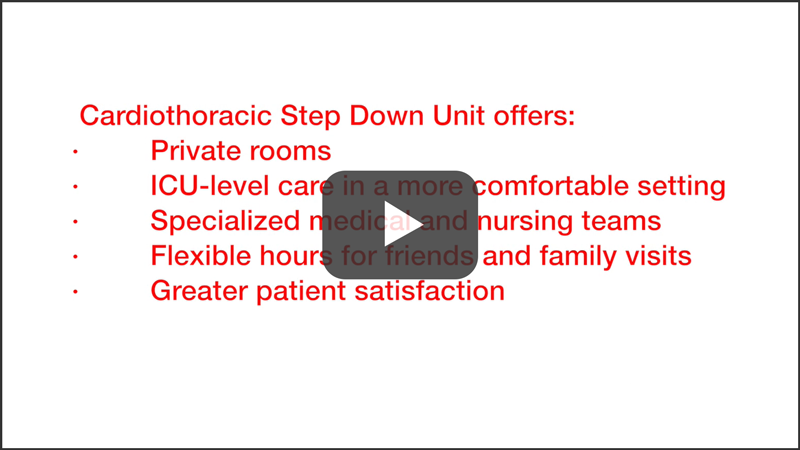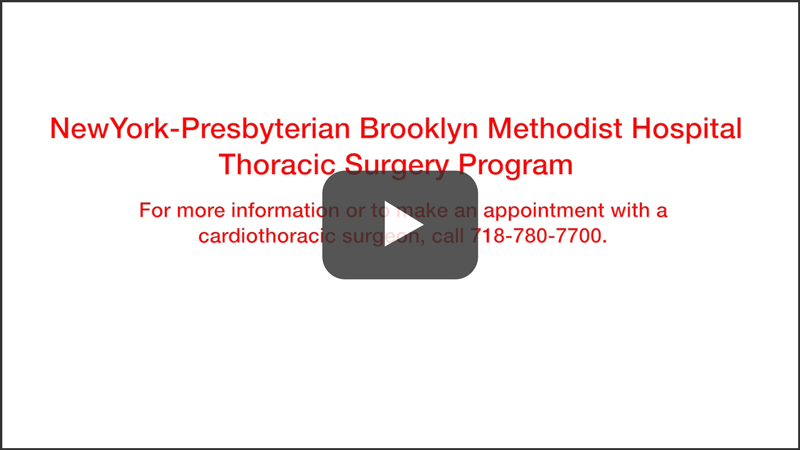Thoracic Surgery
The thoracic surgeons at NewYork-Presbyterian Brooklyn Methodist Hospital provide comprehensive care to people with diseases of the lung, trachea, esophagus, chest wall and mediastinum (the middle section of the chest cavity). We bring together a multidisciplinary team of healthcare professionals who collaborate in one of the nation's top hospitals to manage the full range of thoracic disorders — from the routine to the most complex.
A Commitment to Minimally Invasive Surgery
Most of our patients are able to have minimally invasive thoracic surgery, including robotic surgical procedures. These approaches result in less blood loss, less postoperative pain, a shorter hospital stay, and a quicker recovery and return to normal activities. Minimally invasive approaches also enable many elderly and very ill patients to undergo surgical treatment that they would not have been able to tolerate using a conventional open surgical approach.

Cardiothoracic Step Down Unit

Thoracic Surgery Program
World-Class Lung Cancer Surgery
Most of the thoracic surgeries performed at our hospital are for lung cancer, so our thoracic surgeons have exceptional experience in this area.
- Finding lung tumors earlier. With the advent of lung cancer screening using low-dose CT scanning in people with a history of smoking, more tumors are being found earlier, when they are small. NewYork-Presbyterian Brooklyn Methodist has the largest lung cancer screening program in Brooklyn. We use an approach called navigational bronchoscopy to locate, biopsy, and sometimes treat small and hard-to-reach lung tumors. As of 2023, we also offer robotic-assisted bronchoscopy using the Ion by Intuitive. With its advanced mapping technique and flexibility, the Ion helps physicians target lung nodules that were previously inaccessible.
- Minimally invasive lung cancer surgery. Many patients can have lung cancer surgery using a minimally invasive approach called "video-assisted thoracoscopic surgery" (VATS) to remove the affected lobe of the lung. Patients who have VATS typically experience a shorter hospital stay, more rapid improvement of breathing function, and less postoperative discomfort than those who have open surgery.
- Robotic lung cancer surgery. Some lung cancer surgeries can be performed using a robotic approach. During the procedure, the surgeon sits at a console, viewing the surgical field through the robot's "vision system." The surgeon uses controls to operate the various arms and cameras of the robot, which are placed into position by surgical assistants. The surgery robot enables the surgeon to operate with greater magnification of the surgical field and more precision in the use of surgical instruments.
- Experience treating mesothelioma. In addition to carcinomas of the lung, our thoracic surgeons have more experience than many doctors treating people with pleural mesothelioma, a tumor of the lung lining caused by asbestos.
Minimally Invasive Esophageal Cancer Surgery
Surgical removal of the esophagus for cancer has traditionally required an open approach. At NYP Brooklyn Methodist, we offer this procedure but often use minimally invasive surgical approaches — such as laparoscopy or video-assisted thoracoscopy — whenever possible for people with operable esophageal cancer. We place endoscopes through small incisions in the chest and abdomen to visualize, manipulate, and remove the esophagus and surrounding lymph nodes.
- Surgery for tumors in all locations. Some esophageal cancers can be challenging to remove, due to their location. Our surgeons offer surgical removal of cancers in all locations of the esophagus.
- Robotic esophageal cancer surgery. In some patients, our surgeons can perform minimally invasive robotic esophagectomy.
- Endoscopic procedures. Our surgeons work with the hospital's advanced endoscopists, who can stage esophageal cancer using endoscopic ultrasound and can treat complications — such as opening up an obstruction by dilating the esophagus or inserting a stent.
- A team approach. Our thoracic surgeons collaborate closely with all members of the healthcare team — such as medical and radiation oncologists, gastroenterologists, endoscopists, and pathologists — to ensure that people with esophageal cancer receive the latest comprehensive care in a compassionate and comfortable setting.
- Excellent outcomes. At our hospital, patients who have surgery for esophageal cancer have outcomes (mortality and complication rates, such as leakage at the site of an anastomosis) that are far better than the national average.
- Leaders in research. View Dr. Sebron Harrison's presentation at the about the consequences of refusing surgery for esophageal cancer at 54th Annual Meeting of the Society of Thoracic Surgeons (STS) here.
Surgery for GERD
Gastroesophageal reflux disease (GERD) is a disorder that affects the lower esophageal sphincter, a muscular valve that separates the stomach from the esophagus. People with GERD have a weakened sphincter that allows stomach acid to flow back into the esophagus, causing heartburn, chest pain, and sometimes a sour taste in the mouth. If left untreated, GERD can lead to ulcer formation, bleeding, and scarring. When diet and lifestyle changes are not enough to control GERD symptoms, surgery may help. Our thoracic surgeons perform a minimally invasive procedure called "laparoscopic Nissen fundoplication" to treat GERD. During this procedure, the weakened lower esophageal sphincter is supported by wrapping the top portion of the stomach around the lower esophagus as a bolster.
Minimally Invasive Achalasia Surgery
In people with achalasia, the valve that separate the stomach from the esophagus spasms, preventing food from reaching the stomach easily and causing regurgitation (food coming back up) and swallowing problems. Our thoracic surgeons perform a minimally invasive surgical procedure called "laparoscopic myotomy" to split the abnormally thickened esophageal valve, relieving the spasm and achalasia symptoms.
Thoracic Surgery to Treat Excessive Sweating
Hyperhidrosis, or over-perspiration, is caused by excessive secretion of the sweat glands. If you have this disorder, we understand how embarrassing and disruptive it can be. The cause of the sweating is believed to be overstimulation of the sympathetic nerves that supply the offending sweat glands. Thoracic surgeons at NYP Brooklyn Methodist are able to treat hyperhidrosis successfully using a minimally invasive procedure called "endoscopic thoracic sympathectomy" (ETS), which permanently relieves the nerve overstimulation that causes hyperhidrosis. Most patients are able to leave the hospital the same day as the procedure.
Minimally Invasive Thymectomy for Myasthenia Gravis
People with myasthenia gravis, a rare autoimmune disease, develop severe, sometimes life-threatening weakness. Many benefit from surgery to remove the thymus (thymectomy), which relieves symptoms in most patients and results in a cure for some. Our thoracic surgeons are highly experienced in minimally invasive thymectomy, restoring function and quality of life to most individuals.



